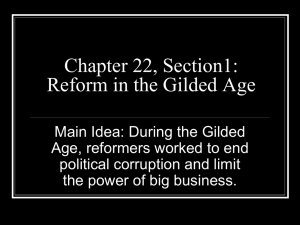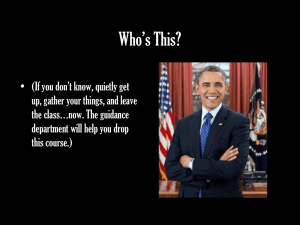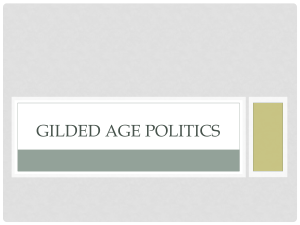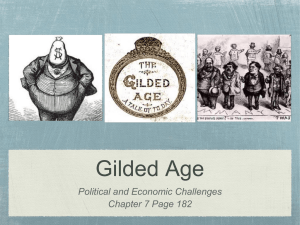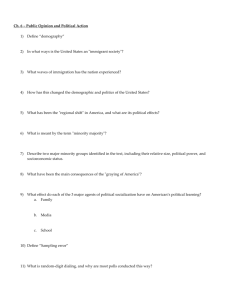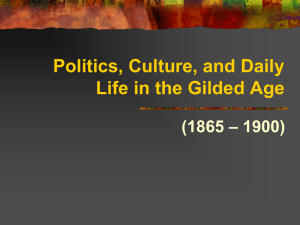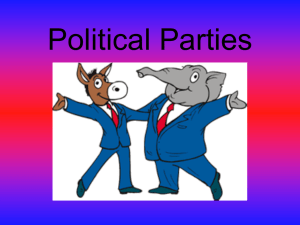LECTURE 03_The Gilded Age
advertisement
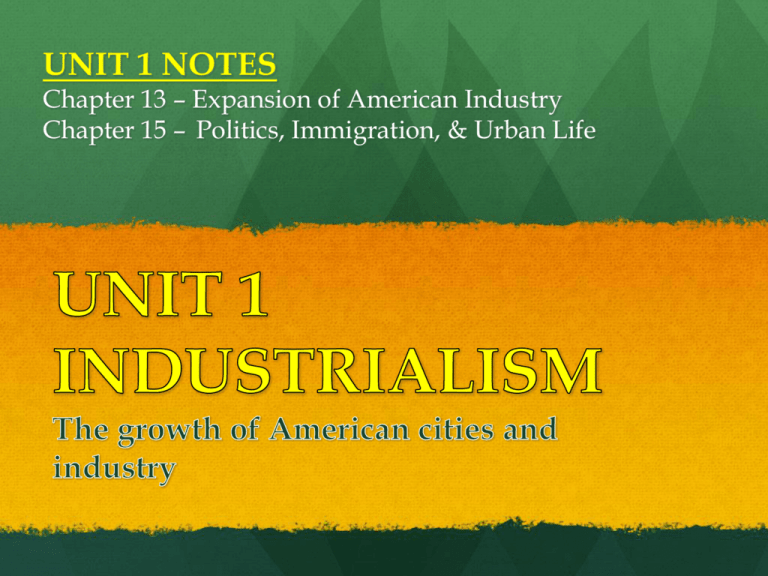
UNIT 1 NOTES Chapter 13 – Expansion of American Industry Chapter 15 – Politics, Immigration, & Urban Life America: Pathways to the Present Chapter 15 Politics, Immigration, and Urban Life (1870–1915) CORE OBJECTIVE: Explain the changes in late 1800’s urban life relating to Immigration, Industrialization, and Politics in the Gilded Age. Objective 1.4: In what ways did government reform the spoils system and regulate railroads? Objective: 1.5: Analyze the challenges immigrants and cities faced late 1800s urban cities. American Industry will grow with positive and negative consequences America: Pathways to the Present Chapter 15: Politics, Immigration, and Urban Life (1870–1915) Section 1: Politics in the Gilded Age Section 2: People on the Move Section 3: The Challenge of the Cities Section 4: Ideas for Reform Presidents of the United States George Washington; Federalist (1788) John Adams; Federalist (1796) Thomas Jefferson (1800) James Madison (1808) James Monroe (1816) John Quincy Adams (1824) Andrew Jackson; Democrat (1828) Martin Van Buren; Democrat (1836) William Henry Harrison; Whig (1840) John Tyler; Whig (1841) #11 - 20 James K. Polk; Democrat (1844) Zachary Taylor; Whig (1848) Millard Fillmore; Whig (1850) Franklin Pierce; Democrat (1852) James Buchanan; Democrat (1856) Abraham Lincoln; Republican (1860) Andrew Johnson; Democrat (1865) Ulysses S. Grant; Republican (1868) Rutherford B. Hayes; Republican (1876) James Garfield; Republican (1880) #21 - … Chester A. Arthur; Republican (1881) Grover Cleveland; Democrat (1884) Benjamin Harrison; Republican (1888) Grover Cleveland; Democrat (1892) William McKinley; Republican (1896) Theodore Roosevelt; Republican (1901) How was politics affected by business in the late 1800s? The Gilded Age: small layer of prosperity covered poverty & corruption of the late 1800s. This term was coined by Mark Twain. Businesses operated without government regulation. This is known as laissez-faire economics. Laissez-faire means ‘allow to be’ in French. Corporations supported government involvement when it benefited them. For example, American businesses accepted land grants and subsidies. A subsidy is a payment made by the government to encourage the development of certain key industries, such as railroads. During Gilded Age, Republicans and Democrats had roughly same numbers To keep party members loyal, candidates rewarded supporters and tried to avoid controversial issues. Under the Spoils System, candidates for political office would offer jobs in exchange for votes. The spoils system also gave supporters access to money and political favors. Before the 1880 presidential election the Republican party was split into factions. The Stalwarts defended the spoils system. The Half-Breeds hoped to reform the system. The Independents opposed the spoils system. On July 2, 1881 President Garfield was assassinated over the spoils system Garfield wanted to reform the system. His running-mate was Chester Arthur, a Stalwart. Charles Guiteau did not get a job he was promised He now wanted Arthur as president. Pendleton Civil Service Act Created a merit system where employees must be fit for govt. work Established the Merit System in which applicants compete for jobs based on their experience and qualifications It limited the number of family members that could apply for civil service jobs After the assassination, President Chester Arthur was able to get congressional support for the civil service act — Assessment On July 2, 1881 President Garfield was assassinated by a Stalwart, which is a Republican who a. Opposed the spoils system b. Wanted to use government funds to complete the Transcontinental Railroad c. Defended and supported the spoils system d. Supported any government that gave greater rights to workers The Pendleton Civil Service Act was passed to a. b. c. d. Cancel laws that required government workers to be paid by tariffs End the high tariffs created during the Gilded Age End the spoils system and ensure government employees are qualified Print money backed by silver rather than gold. — Assessment On July 2, 1881 President Garfield was assassinated by a Stalwart, which is a Republican who a. Opposed the spoils system b. Wanted to use government funds to complete the Transcontinental Railroad c. Defended and supported the spoils system d. Supported any government that gave greater rights to workers The Pendleton Civil Service Act was passed to a. b. c. d. Cancel laws that required government workers to be paid by tariffs End the high tariffs created during the Gilded Age End the spoils system and ensure government employees are qualified Print money backed by silver rather than gold. THE MACHINE Rapidly growing cities were difficult to govern. Increased revenue and responsibilities gave city governments more power and competition for control grew more intense. Different groups represented the interests of different classes. The political machine: unofficial city organization designed to keep a group in power. Political machines worked through the exchange of favors. WHAT DOES THIS MEAN? CORRUPTION Machines won the loyalty of immigrants by providing them with apartments, jobs Provided paved streets and sewer systems They protected criminals through bribery Popular bosses: Tom Pendergast in KC - Helped Harry Truman William Marcy Tweed - Ran NY Machine Political machines worked through the exchange of favors. Many people who wanted favors would pay money, machine. to the Graft was a major source of income for the machines. Many immigrants accepted help from those who promised financial assistance Business gained an edge over unions through government corruption A contractor who was eager to win a city contract for a construction project would pay government officials who could throw the contract their way THE FLOW OF POLITICAL MACHINES Political Machines Businesses pay large amounts of money for permits and contracts Bribes are given to city leaders and political machines Local Business Graft Machines are headed by a boss and keep one political party in power Immigrant Votes City Leaders City leaders are controlled through immigrant votes Why did many immigrants support political machines? a. Political machines provided them with jobs. b. Political machines were free of corruption. c. Political machines put powerful ‘bosses’ out of business. d. Political machines fought against crime in the slums. Many people who wanted favors would pay money, or ______________, to the political machines. a. Settlements b. Graft c. Temperance d. Capital payments Why did many immigrants support political machines? a. Political machines provided them with jobs. b. Political machines were free of corruption. c. Political machines put powerful ‘bosses’ out of business. d. Political machines fought against crime in the slums. Many people who wanted favors would pay money, or ______________, to the political machines. a. Settlements b. Graft c. Temperance d. Capital payments
